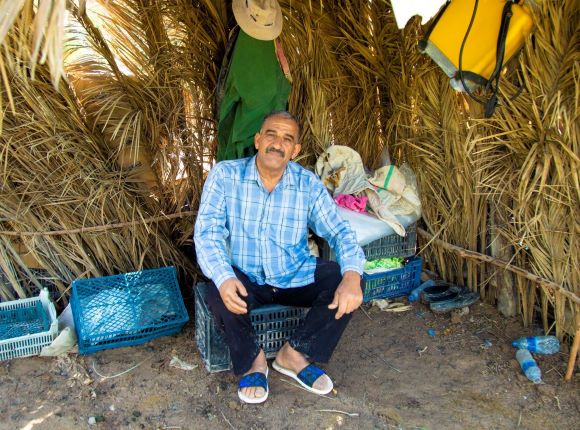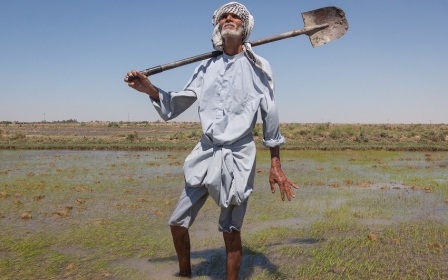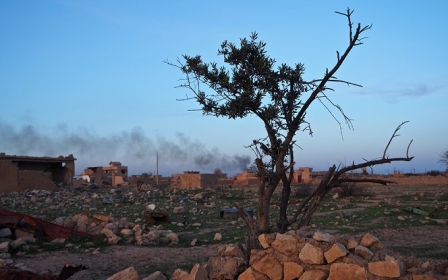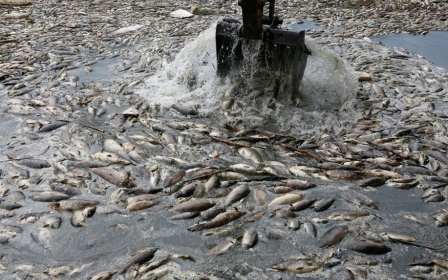Date growing crisis in Iraq's 'black land'
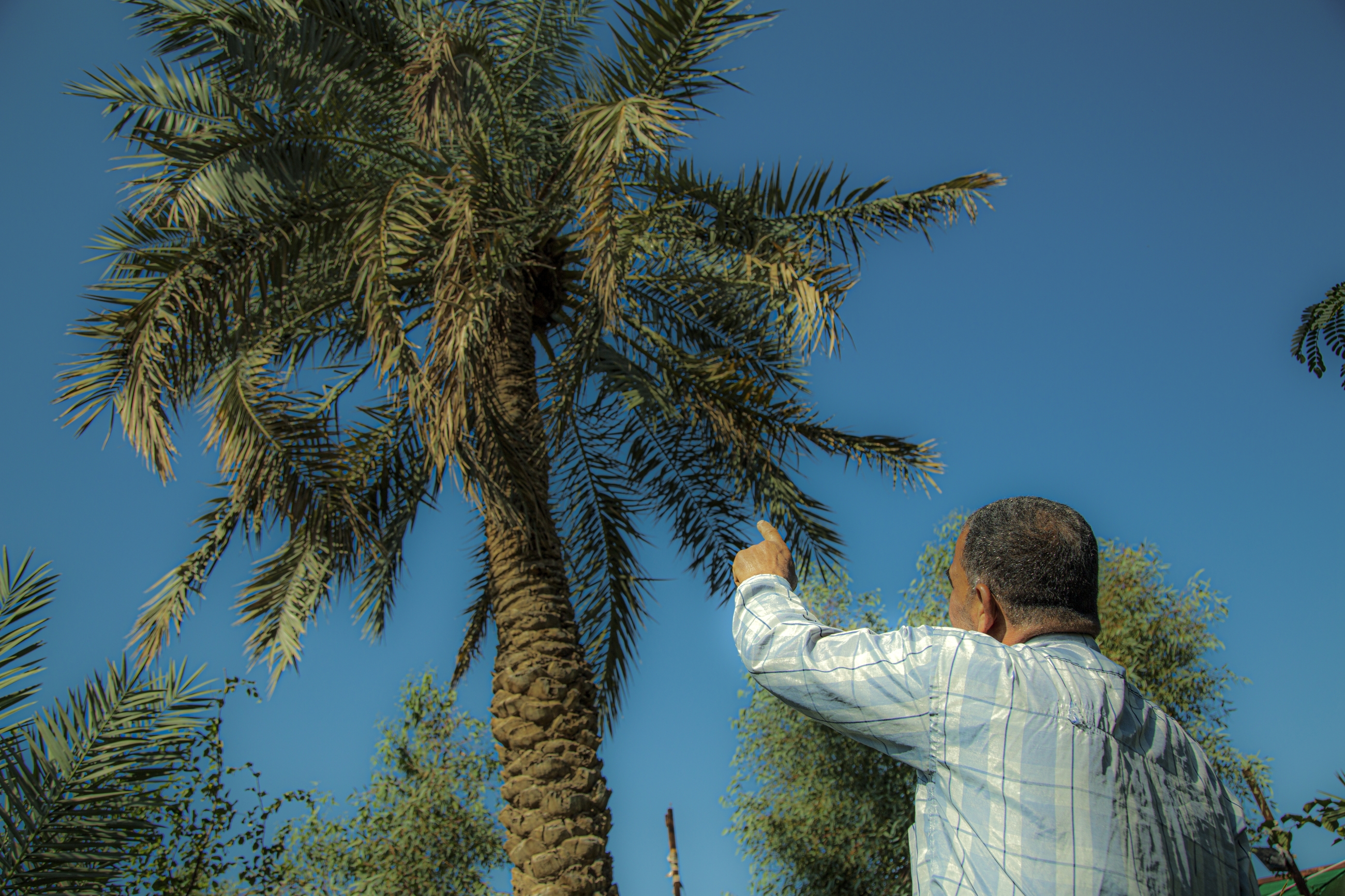
Abdullah Abdul Jabbar, 62, has spent four decades cultivating dates and other crops in a plot of land appended to his house in the Abu al-Khaseeb district of Basra.
Taught how to farm by his father, Jabbar, who is known by locals as Abu Ghassan, he continues to tend to his fields despite a disability in one of his hands.
“As long as I have the will to work, I will do it. Nothing stands against my will,” he told Middle East Eye. Nevertheless, his stoic determination to grow dates is belied by the reality that the industry is a shadow of its former self.
Abu Ghassan remains in the trade despite decades of war, the deteriorating environmental situation in southern Iraq, and cheap imports undercutting locally grown produce.
Basra, the second largest city in the country, was once widely known for the quality of its dates, which include the Hillawi, Khadrawi, Sayer, Maktoom, Derrie, Ashrasi and Barhee varieties.
New MEE newsletter: Jerusalem Dispatch
Sign up to get the latest insights and analysis on Israel-Palestine, alongside Turkey Unpacked and other MEE newsletters
To Iraqis, the southern city was known as the “black land” due to the density of its date palms, and many of the city’s residents, known as "Basrawis", were dependent on the date industry for their livelihoods.
Iraq used to produce three quarters of the dates in the world, but its production now represents only five percent. From a high of 33 million date palms in the 1950s, just nine million remain, according to environmentalists. The number of factories processing dates has similarly experienced a dramatic fall since the 2003 invasion of Iraq - down to just six compared to 150 before the war.
These are numbers Abu Ghassan can attest to on a personal level, having seen the number of trees he owns fall from 5,000 in the 1980s to just 17 today, a fact he describes as "painful" and "shocking".
Abu Ghassan still relies on farming for his income but he has had to diversify the type of crops he grows to ensure he can make ends meet.
“Right now, I focus more on cultivating vegetables more than date trees,” he said.
“I grow different kinds of products, such as eggplant, cucumber, okra, tomatoes and leafy vegetables.”
War and pollution
There are many factors that have contributed to the decline of Basra’s date palm industry but Iraqi academic, Said Abdulridha al-Alwan, traces the start back to the reign of former Iraqi president, Saddam Hussein, and specifically the Iran-Iraq War between 1980 and 1988.
Due to the city’s proximity to the frontline between Iraqi and Iranian forces, many growers decided to “uproot” their palm trees and take them to the other areas of Iraq, said Alwan, a lecturer at the College of Environmental Sciences at the University of Basra.
According to Alwan, the sheer number of date palms in the Basra area also caused logistical problems for Hussein’s armies and were therefore destroyed, as a result.
“Millions of date palm trees crowded the banks of the Shatt al-Arab river, Abu al-Khaseeb district and al-Faw district but they were all cut down by Saddam’s regime to create battlefields and roads for military vehicles,” he said.
However today it is not war but environmental causes and human behaviour, both domestic and international, that have made Basra’s agricultural lands less hospitable to crops like date palms.
A 2019 Human Rights Watch (HRW) report said mismanagement by Iraqi authorities, as well as damming of upstream rivers by neighbouring countries, such as Iran, Syria, and Turkey, had decreased fresh water flows into the Shatt al-Arab and consequently increased salinity levels.
The problem is further exacerbated by droughts believed to be induced by global climate change, as well as the depositing of pollutants in the waterway meaning what is there is unfit for human consumption and agricultural use.
Alwan said: “Soil salinity and environmental pollution has led to low production and a decline in the quality of date crops.”
One environmental expert, who wished to remain anonymous because they were not authorised to speak, blamed the pollution of Iraqi waters around Basra on pollutants dumped upstream by “Iranian” authorities, but international groups, such as HRW place the blame primarily on successive Iraqi governments.
“Policies and practices of Iraqi authorities since the 1980s have been the principle cause of the degradation in the Shatt al-Arab’s water quality,” HRW’s 2019 report said.
‘Tank of poison’
For farmers like Abu Ghassan, the end result is dead crops and further damage to the source of their livelihood.
“Most of the trees died due to water salinity and pollution. The main source of water coming to my land is from the Shatt al-Arab river, which has become a tank of poison rather than (a source of) fresh water.” He said.
“My land was full with several kinds of the best dates, including: Hillawi, Khadrawi, Sayer, Maktoom, Derrie and Ashrasi, but today, I only have Buraim and Barhi.”
Despite these impediments, Abu Ghassan believes strongly in the quality of his produce, especially over foreign imports.
“Dates and vegetables that are cultivated locally are fresher and taste better than imported products but people prefer to buy imported goods because of how cheap they are,” he said.
Abu Ghassan is able to sell his stock he has to local vendors with relative ease due to their reputation for taste and high quality, but he nevertheless warns that the Iraqi government must act now to incentivise local food production for farmers like himself.
“The government should levy taxes on imported food products to encourage Iraq’s local farmers to cultivate (their land) and bring back agriculture to the city,” he said.
“Unfortunately, no one hears our voice, to whom do we complain?”
Middle East Eye delivers independent and unrivalled coverage and analysis of the Middle East, North Africa and beyond. To learn more about republishing this content and the associated fees, please fill out this form. More about MEE can be found here.


